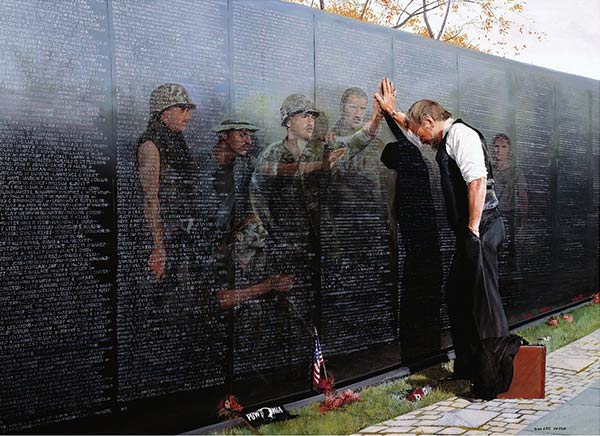Subtotal: $
Checkout
When the Parades End
We need to look deeply into the souls of veterans to see the real suffering that war causes, not only to soldiers but to everyone.
By Thich Nhat Hanh
November 11, 2022
Available languages: Español
In the 1960s and 1970s, the Buddhist struggle for peace in Vietnam arose from great suffering. Blood and fire ravaged the countryside, and people everywhere were uprooted. Yet few understood that we only wanted peace, not a “victory” by either side.
When I came to the United States in 1966, I was exiled from my own country because the voice of the Vietnamese people, asking for peace, was being heard. The teachings and practices of Vietnamese Buddhists have always sought to heal the deep wounds of society; to transform the suffering, hatred, and anger of all wars so that people will be able to accept, love, and embrace each other.
I have come to believe that men kill in war because they do not know their real enemy and because they are pushed into a position where they must kill. We are taught to think that we need a foreign enemy. Governments work hard to get us to be afraid and to hate so we will rally behind them. If we do not have an enemy, they will invent one in order to mobilize us. Yet they are also victims.

Lee Teter, Reflections, oil on canvas, 1988
When soldiers return from war, they cry because they are alive. Their parents, wives, husbands, children, and friends cry for joy. But when the parades end, what do we have? What do the wives, husbands, children, brothers, and sisters of soldiers receive when their loved ones return from war after so much fear, hatred, and killing? Soon the war wells up from within their deepest consciousness. Their families and the whole of society endures their pain for a long time. For whom is this a victory?
We must look deeply into the souls of the soldiers who have returned from war so we can see the real suffering that war causes, not only to soldiers, but to everyone. When we train young people every day to kill, the damage is deep. They have known anger, frustration, and the fear of being killed. If they survive, they bear scars for many years. These kinds of wounds last for a long time and are transmitted to future generations. We cannot imagine the long-term effects of watering so many seeds of war.
Even so, we cannot divide reality into two camps – the violent and the nonviolent – and stand in one camp while attacking the other. We cannot blame and condemn those we feel are responsible for wars and social injustice, without recognizing violence in ourselves. It is not correct to believe that the world’s situation is in the hands of the government and that, if the President would only have the correct policies, there would be peace. It is our daily lives that have the most to do with war.
When soldiers return from war, they cry because they are alive. But when the parades end, what do we have?
If we look deeply into the weapons of war, we will see our own minds, our own prejudices, fears, and ignorance. To work for peace is to uproot war from ourselves and from the hearts of men and women. To do this, we must learn to listen in a way that helps us to understand the suffering of others, to see the real losses, the real casualties of war. Just by listening deeply, we can already alleviate a great deal of pain. This is the beginning of healing.
If veterans can achieve awareness, transformation, understanding, and peace, they can share with the rest of society the realities of war. We who have experienced war directly have a responsibility to share our insights and experiences concerning the truth of war. For if people do not know what war is, they will not be able to appreciate peace and will destroy the peace that is available. This is a very hard fact for those of us who have come out of a war and know exactly what it is. And so we must share the truth, not out of anger, but out of love. Our people need us to do it.
We do not have time to embrace our pain in private anymore. We have to reveal ourselves so that we will be able to avoid starting another war in the future. We have to open the door for young people to come and touch the war, the bomb that is ready to explode everywhere. We have to show the young the hell and suffering that is war. Then they will be able to identify, appreciate, and protect peace. To make the world a peaceful place, to ensure for our children and grandchildren a life worth living, we need a transformation.
From Hell, Healing, and Resistance: Veterans Speak by Daniel Hallock (Plough Publishing House, 1998).
Already a subscriber? Sign in
Try 3 months of unlimited access. Start your FREE TRIAL today. Cancel anytime.







Kurt Stiansen
I am a Veteran and I appreciated the piece on the hell of war and the resultant effects on both combat soldiers (ground pounders) and support troops, their families and the public at large and the hole it leaves in all of our souls. It is articles like this that helps transfigure the holes into wounds that can heal. I believe the same goes for racial prejudice.